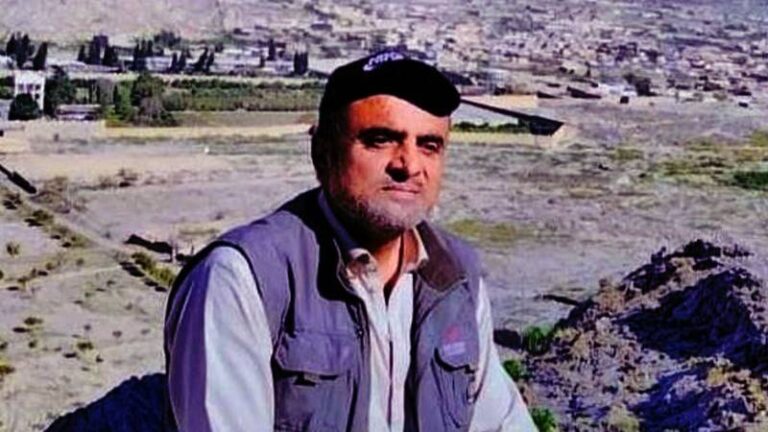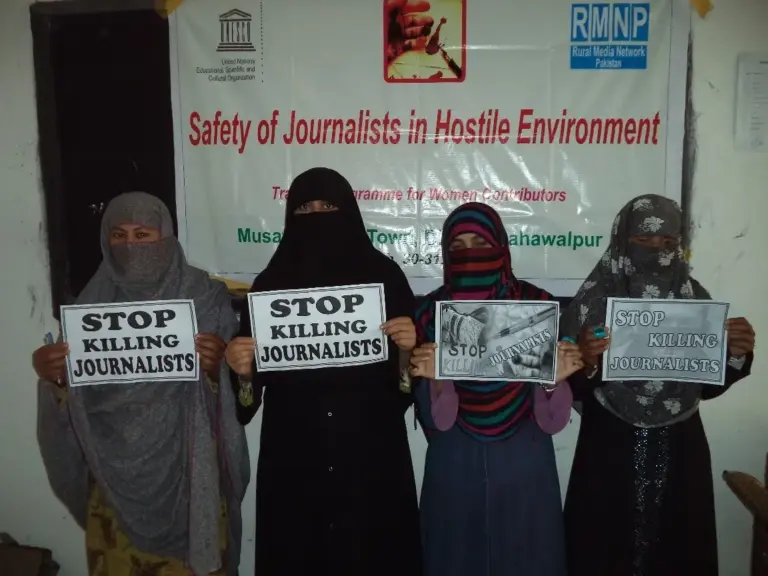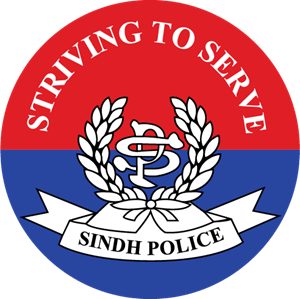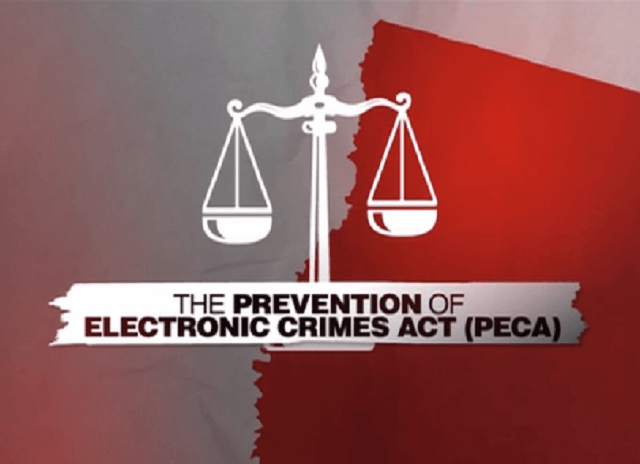RMNP-UNESCO World Press Freedom Day Round Table ( May 3,2019)
Rural Media Network Pakistan in collaboration with UNESCO organised a round table on the theme “Media for Democracy: Journalism and Elections in Times of Disinformation”. It was held on 3rd May at 9 AM in the premises of Punjab College AhmedpurEast. This event provided a platform for multiple actors to exchange on current issues, threats and achievements concerning freedom of the press in Pakistan.

RMNP-UNESCO roundtable was jointly chaired by Professor Shehzad Ahmed Khan and Professor Dr Muhammad Sajjad Paracha Chairman Media Studies Department Islamia University Bahawalpur while it was attended by regional leaders of main stream political and religious parties Abdul Basit Shikrani (PTI),Syed Salahuddin Ahmed Jeelani (PMLQ),Muhammad Ali Ahsan (PPP),Ahmed Khan Babar (PMLN),Maulana Muhammad Hussnein Chuhan(JUI),maulana Hameedullak Khan Aziz ( Jamiat Ahle-Hadith) Ms Syeda UmulBaneen (PPP), Ms Aasia Batool (PTI) prominent educationist Muhammad Suleman Farooqi besides male and female journalists and heads of different press clubs. All participants took part in this round table which lasted for four hours.
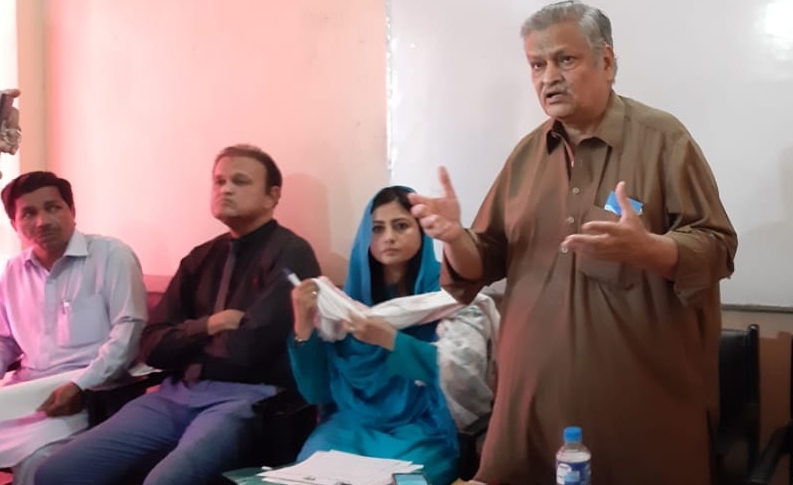
Senior Vice President National Club Islamabad Dr. Ms Sadia Kamal travelled from Islamabad to AhmedpurEast to express her solidarity with her colleagues in rural Pakistan. Participating in debate, she said that in our country, the situation of press freedom is quite grim since journalists operate under threat and often get killed while doing their duty. She stated that ideally, media should provide a platform for balanced information on candidates and issues during elections and function as a vehicle for promoting public debate and ensuring access to information that educates. Media during elections should involve the electorate, as well as monitor the integrity of the electoral process and hold governments to account. However, this is far from the reality in many countries with developing democracies like Pakistan. She cited Rohi TV channel where serving as newscaster she was given a pre-set media agenda in favour of Pakistan Tehreek-e-Insaf in 2013 general elections as that time Rohi TV channel was owned by PTI stalwart Jehangir Tareen.
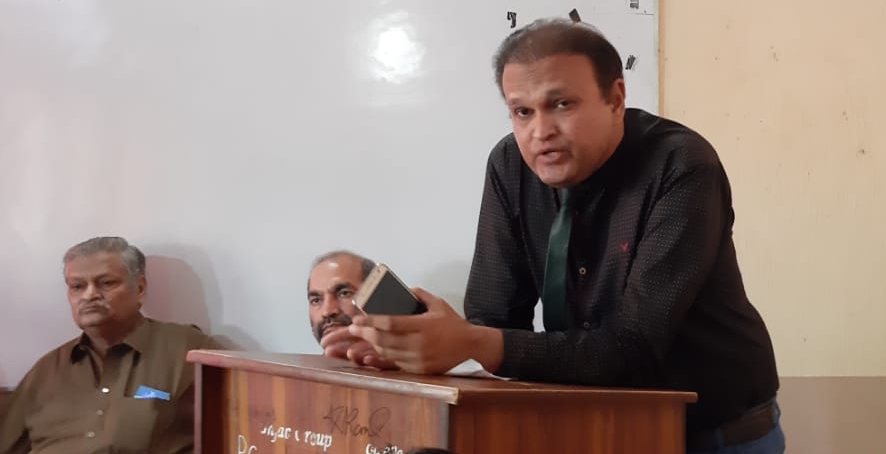
Prominent educationist Muhammad Suleman Farooqi alleged that in recent years, Pakistan’s media outlets have started working as lobbyist. Most of the media houses are critical of the government while a couple of news channels and newspapers are supportive or try to stay neutral. It won’t be contrary to the fact that media in Pakistan is both part of the solution and part of problem, as the pendulum is tilting towards non-professionalism. May be in near future, it becomes part of the solution and starts disseminating information in a more impartial manner, he concluded.
Senior journalist & former research coordinator Tokyo University Japan, Khalid Saeed addressed the WPFD round table through Video link from Karachi. He touched upon various issues like crimes against journalist, freedom of expression, financial pressures on electronic and print media and role of media during elections.
Talking about reasons for impunity, he said that it was impossible to get legal support in cases of threats and killing of journalists, besides investigation and prosecution aside, not even an FIR had been registered in some cases. Even, there is no legal protection at all for journalists and resources to pursue the cases of slain journalists in the courts.
Referring to the role of media during elections he said that media play a vital watchdog role in holding governments accountable and ensuring the effective functioning of a democracy. Governments are obliged to ensure the existence of a democracy that ensures media pluralism, especially in elections.
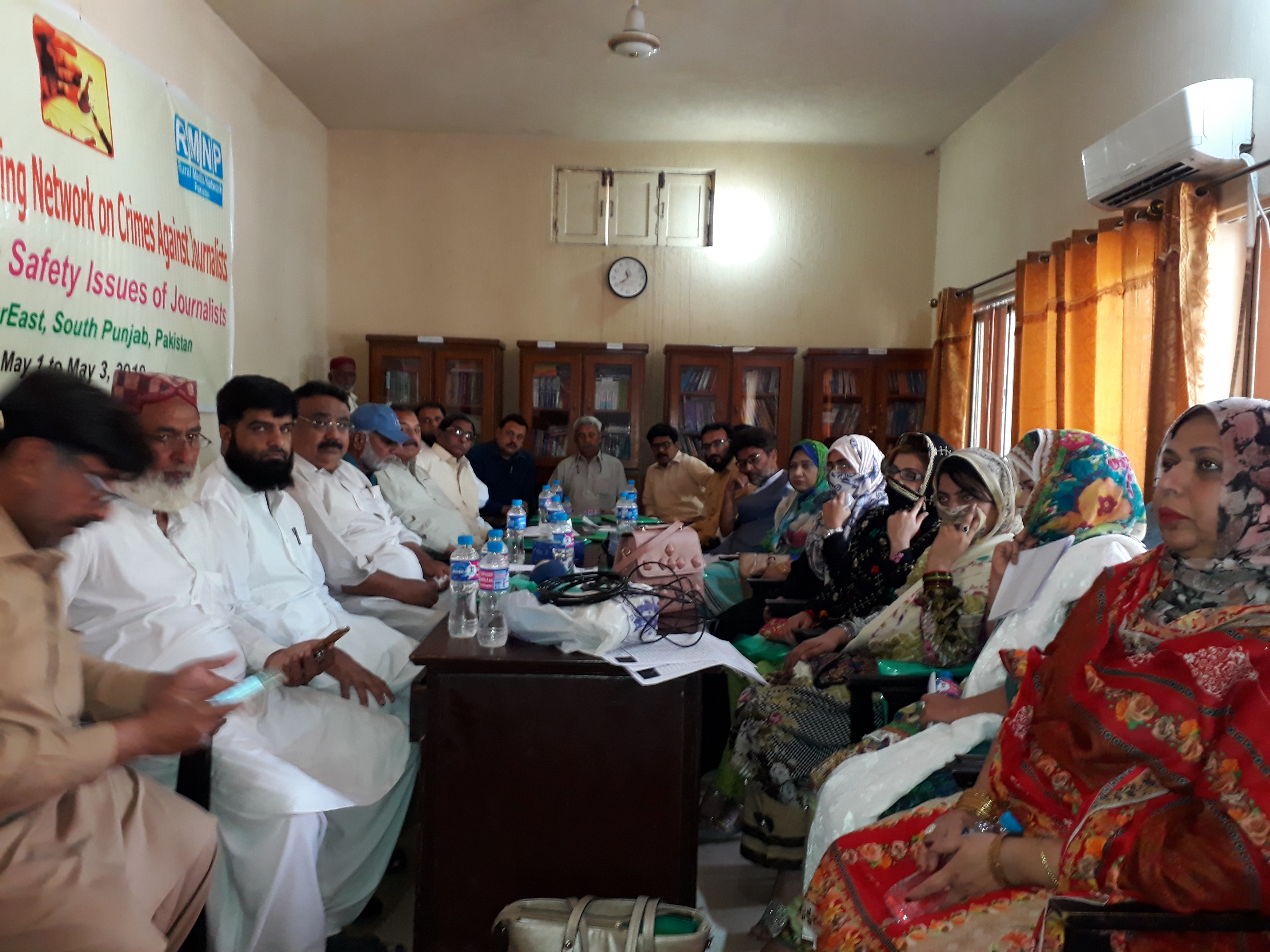
He said freedom of political debate is a fundamental right and government media are obliged to publish opposition views. Political expression may be restricted only for extraordinary reasons. The media plays a major role in keeping the citizenry abreast of current events and raising awareness of various issues in any society.
He said, it also has an extremely significant impact on the public’s views and way of thinking. The media is the primary means through which public opinion is shaped and at times manipulated. If this is the media’s role then in normal course of events, it becomes even more vital in exceptional periods, one of which is electoral junctures, when the media becomes a primary player.
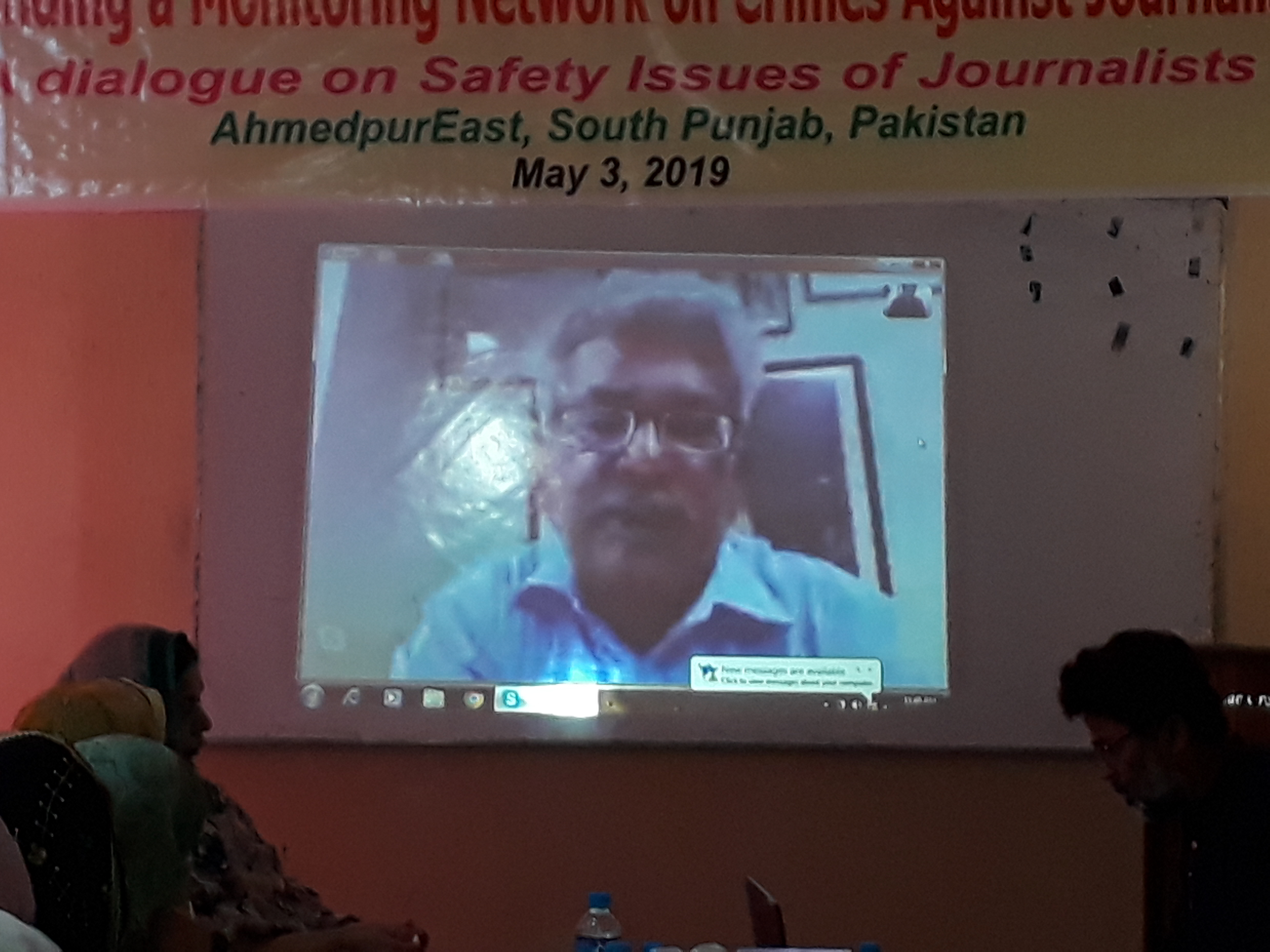
Senior journalist Khalid Saeed talking through video link from Karachi
He said that elections constitute a basic challenge to the media, putting its impartiality and objectivity to the test. The task of the media is not and should not be to function as a mouthpiece for any government body or particular candidate. Its basic role is to enlighten and educate the public and act as a neutral, objective platform for the free debate of all points of view.
Professor Shehzad Ahmed Khan said that press freedom is vital for independent public media to effectively provide impartial, fact checked and quality news, holding power to account and informing citizens, especially during an election period. He said that it is the responsibility of media persons to inform public about political parties, candidates and voting process: cover election activities with balance and impartiality. There should have no bias against any party or candidate and should avoid news based on rumours and speculations. There should be ban on all kind of hate speeches that may incite for violence; all parties should be given appropriate media coverage; Media has the duty to respect and promote tolerance. Candidates of minorities should also be given air time; there should be clear distinction between opinion & news and the audience be provide a chance to ask direct questions in live programs. Opinions polls’ results should be aired or published with complete details about methodology of conducting the polls and Election result should not be portrayed as officials ones till the ECP announces them. He suggested that the higher education institutions should be strengthened so that they become fully capable to prepare such media professionals who could fulfill their responsibilities to cope with the challenges of elections, democracy, fundamental rights and free but responsible media in Pakistan.
Professor Dr. Sajjad Ahmed Paracha Chairman Media Studies Department Islamia University Bahawalpur while participating in debate said that general election is a critical juncture in the affairs of any democratic country where political forces, people and media work together to elect rulers. Political forces give their manifestoes to attract voters, while media not only educates politicians and voters but also plays an important role for fair elections. Free media is a must for democracy. The function of media is to provide the people with maximum information on all issues that matter in taking an electoral decision such as performance of their representatives, the status of development works in different areas, changes in voting procedures and rules, new developments in respective constituencies, etc. Gathering this much information and reporting it in effective manner is not as easy and simple as it sounds. It is challenging and requires special preparations. The key is to prepare well and prepare before-hand as you would have to work under tight deadlines with no margin of error.
He stated that it is the journalists’ professional obligation to contribute to political history by impartially covering election activities; maintain freedom of press; play role of a watchdog; defend electoral rights of women and other marginalized groups; educate voters; allocate adequate space/time to news irrespective of gender, religion and partisan politics and look for and report irregularities in the polling process to make elections fair. Media persons, as the watchdog of democracy, must be more law- abiding citizens than any other citizen of the country. It is said that if a media person breaks a law, he will not be able to report laws’ violations by others accurately. During Elections, Election Commission of Pakistan (ECP) issues Code of Conduct for Media which is not strictly followed. But, these violations, most of the times, are ignored by the authorities. Media must take a lead and should strictly follow the Code of Conduct while covering the elections.

President RMNP Ehsan Ahmed Sehar presented his ideas in the round table and told that reporting during elections is often marred by bad or weak relations between media, police, government election entities and political actors. How do these parties find common ground? he questioned. RMNP chief underlined the need of launching media and elections support programme in rural Pakistan. Under this programme , journalists should be asked to interact directly with electoral technicians to understand the election process rather than only focusing on political personalities. In addition, several citizens meetings should be held in rural areas with election officers, media and the communities to push for better access to information about elections in rural areas. The broad collaboration which will run parallel with the election cycle, keep the media focused on issues of public concern while citizens will have better access to relevant information than previous years. The critical elements here are collaboration and dialogue, improving the electoral debates. Previously, there was a lot of division between the stakeholders who should be brought together. Previously everyone was doing their own thing. Next time we should be a one stop shop in terms of support for media with access to information from electoral bodies. We should build mutual trust amongst these and also the police. Good journalism succeeded despite often competing political, power and financial interests, he claimed.
President RMNP demanded all the political and religious parties devise a code of ethics for their party workers before the forthcoming local bodies’ elections. He also demanded the parties educate their workers to respect freedom of expression and must follow code of ethics.
He stressed the need for the security of the media men, and their equipment, covering political processions and rallies. “Recent events depict that journalists have to face untoward situations from workers of various political parties while covering public meetings,” he regretted. He urged the media houses to provide bullet proof jackets to media workers for their safety in the field. “A journalist must be provided all requisite facilities and security measures before being sent to cover a disputed or dangerous assignment,” he maintained. He told the participants that 37 journalists have been killed in Pakistan during last five years but only eight cases have been resolved without any conviction. Ehsan Ahmed Sehar highlighted the Rural Media Network Pakistan’s role in sensitising rural journalists on their safety issues and informed the participants that RMNP with the support of UNESCO and Doha Centre For Media Freedom have organised 30 safety training workshops in different districts of rural Pakistan since 2011

A unanimous resolution was passed in this round table in which The Rural Media Network Pakistan (RMNP) expressed grave concerns over failure of the Pakistani government to inform the UNESCO director general about legal proceedings of murder cases of the journalists assassinated in the line of duty. Through the resolution, the participants demanded the Pakistani government to fulfill its obligations regarding safety of journalists as it is a signatory to the UN General Assembly. They also demanded the government to provide safe environment for working journalists. After President RMNP presentation, Dua was offered for the departed souls of those Pakistani journalists who have been killed in the line of duty while all participants observed one minute silence for all those journalists who were killed throughout the globe.
Messages Read & Distributed:
RMNP distributed messages of Secretary General United Nations and Commonwealth Journalists Association UK stalwart Mr William Horsley in the beginning of the World Press Freedom Day round table. RMNP member Ms Saba Aslam read these messages in the round table after recitation of Holy Quran.
WAN-IFRA Film:
Participants watched World Association of Newspapers & News Publishers (WAN-IFRA) film during World Press Freedom Day round table.Thanks to Mr Andrew Heslop Director Press Freedom WAN-IFRA for sharing.
Award Giving Ceremony:
Mayor city Malik Usman Rasheed Bobak was the chief guest in the award giving ceremony who along with President RMNP Ehsan Ahmed Sehar presented RMNP Best Female Journalist Cash Award” to Dr Ms Sadia Kamal Senior Vice President National Press Club Islamabad as a recognition of her services in both rural and urban journalism since 2007.
Source: RMNP

